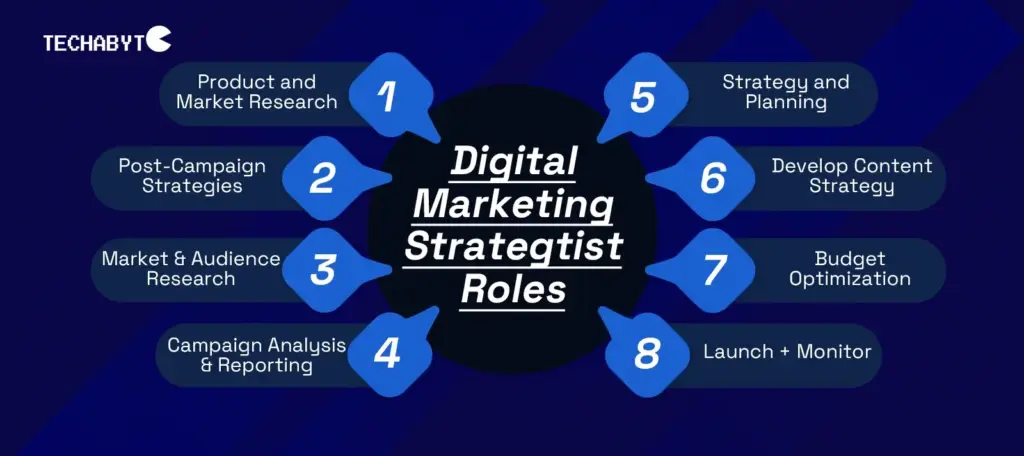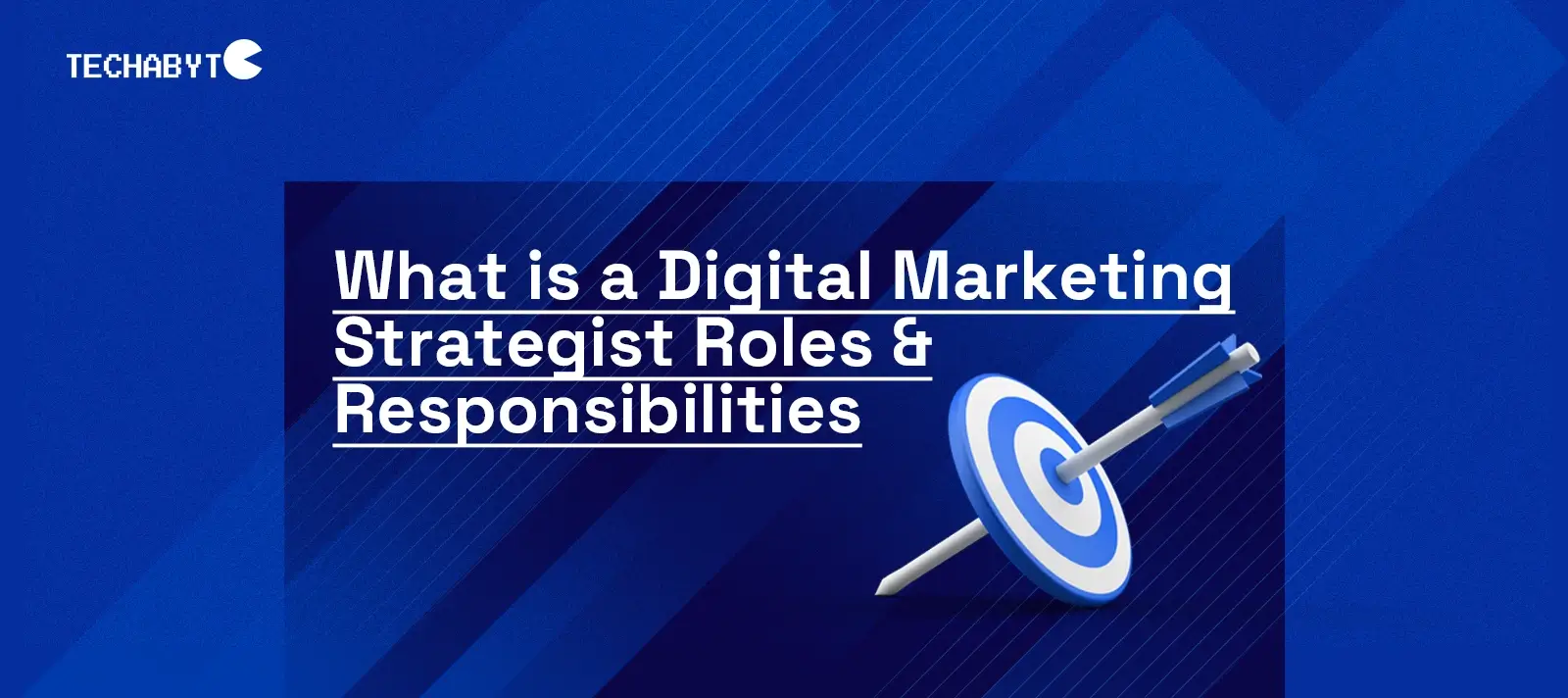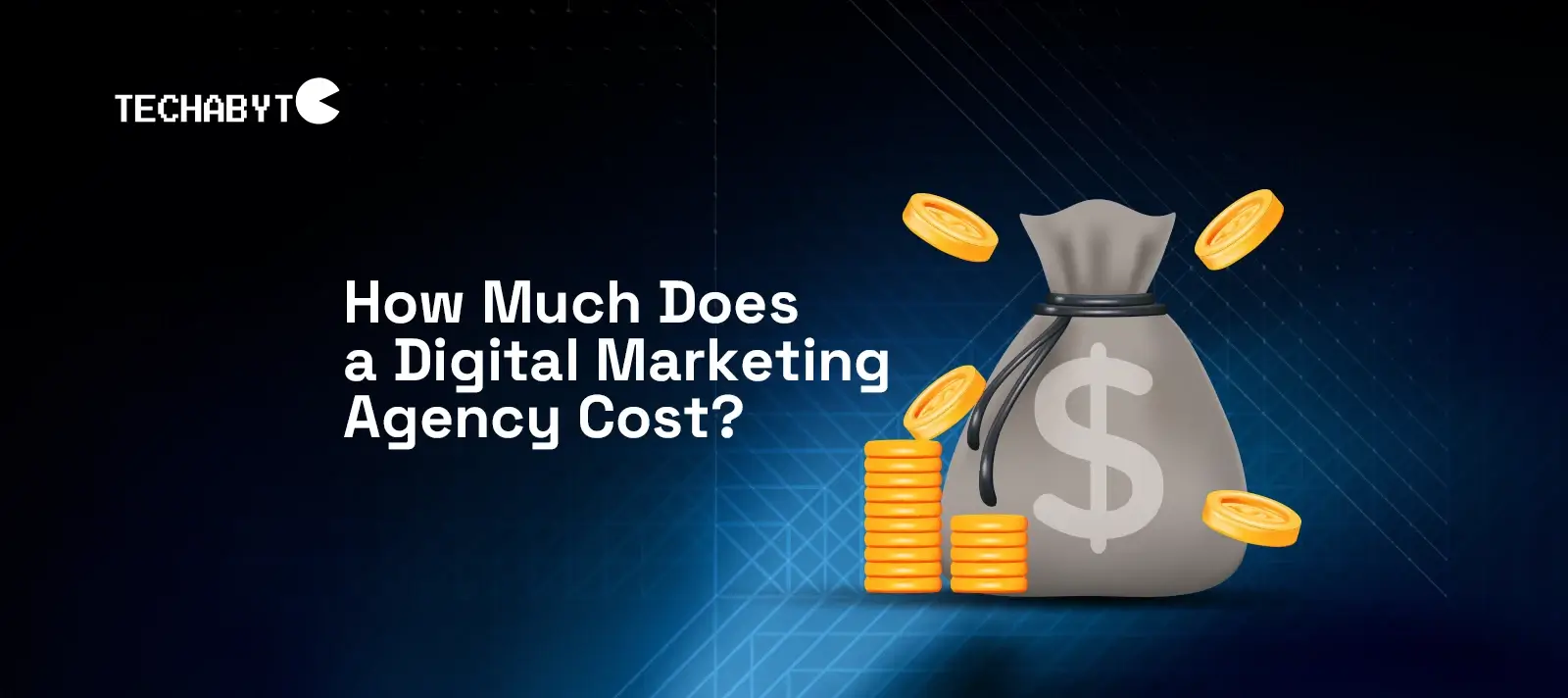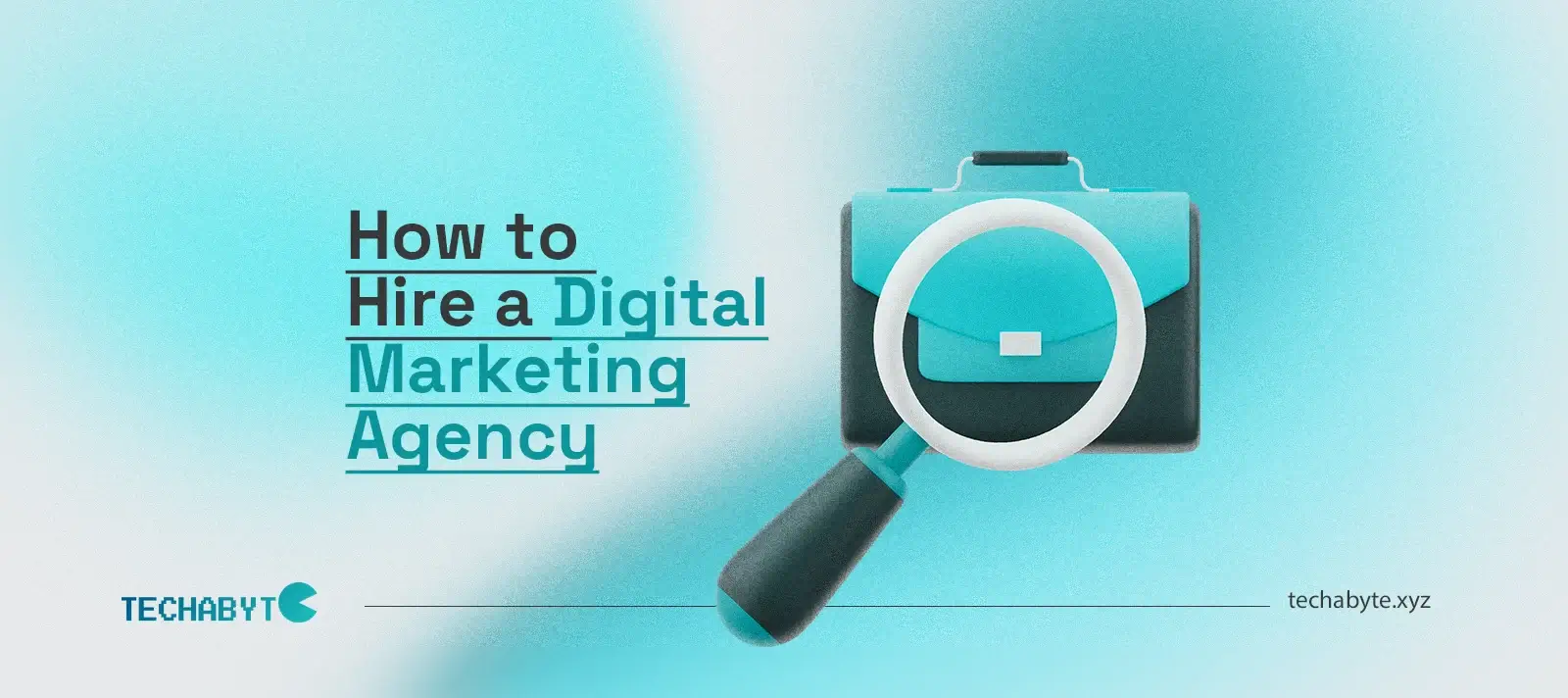What is a Digital Marketing Strategist?
A digital marketing strategist is an expert in planning, implementing and optimizing all the online marketing strategies. A strategist is responsible for analyzing, forecasting, and planning marketing campaigns across various digital channels (such as email, social media, SEO etc.) and implementing and optimizing to see how they are performing in order to make data-driven decisions and focus on improving KPIs like AOV, bounce rate, cost-per-acquisition etc.
A digital advertising strategist typically works in an agency, focusing on problem-solving as a brand planner, and leading cross-functional teams to make sure the strategies are well executed for each brand. The purpose of a strategist is to improve brand awareness, online visibility, campaign effectiveness, social engagement and increased ROI.
So, what does a digital marketing strategist do?
In short, a marketing strategist or a web marketing strategist typically:
- Conducts research about the product and market.
- Plans marketing strategies to improve online marketing campaigns
- Puts content and campaign strategies in place.
- Executes and monitors marketing campaigns to see how they perform.
- Applies performance marketing principles to optimize the running campaigns and bring real-time return on investment (ROI).
A digital strategist doesn’t involve himself in content production, media-buying or graphics design; rather plans a digital strategy to guide how these should be executed.
Not just that, a digital marketing strategist is, to some extent, a combination of product manager and marketing analyst, researching a product market to identify what product features the market wants, collaborating cross-functionally with developers, designers and marketing teams with go-to market strategies; and afterwards, analysing the marketing campaigns to decide the next moves for optimization and campaign pivoting.
What are the roles and job descriptions of a digital marketing strategist?
Usually, the role of a digital brand strategist revolves around planning and monitoring digital marketing activities, but they can extend or differ based on the nature and purpose of the marketing agency.

For example, many agencies hire digital strategists to launch go-to-market strategies and perform data analysis on the existing campaigns. In other companies, digital strategists are hired to work on particular channels only, like optimizing content strategy on SEO, or improving KPIs such as cost per acquisition (CPA) on PPC campaigns, increasing social traffic or monthly growth rate on conversion rate from social media etc.
Apart from that, the general roles of a digital marketing strategist are:
#1 Product & Market Research
First off, a digital strategy consultant conducts a full-scale research on:
✅ The product and its features & benefits.
✅ Unique selling proposition (USP) and the value proposition it serves on the market.
✅ Current trends and market conditions.
✅ Recent changes in search engine algorithms.
Next, the strategist explores the market, different buyer segments and niches to identify which target audience is fit for the existing features. That audit aligns with finding new customer niches that the strategist might have opportunities to market their products too.
Based on the audits done on the competitors, the strategist finds out the gap between their marketing activities and the client’s efforts and sees how the competitors are staying ahead, grabbing the market attention.
Meanwhile, the digital media strategist audits clients’ current marketing campaigns to see the loopholes, content gap and improvement tactics to optimize ideas for the next digital marketing strategy.
In short, a marketing strategist starts their responsibilities by:
- Conducting full-scale research on product, market and competitors.
- Analyzing different customer segments and target audiences.
- Conducting competitor research to find out their efforts and strategy.
- Auditing the current client campaigns to see flaws to improve.
#2 Leading Cross-functional Teams for Collaboration
An online marketing strategist connects with cross-functional teams based on the findings from market research, current campaign insights and competitor analysis.
This involves sharing product market-fit insights, identifying existing campaign opportunities, readjusting product messaging, and developing content strategies.
In that case, a digital strategist works closely with designers, developers, sales executives and content marketers and guides them to the latest findings for the next content strategy.
In essence, a digital media strategist leads cross-functional teams for:
- Sharing market and product insights with the team.
- Inform the current aspects of the client’s campaigns.
- Guiding the teams with product development and brand messaging.
- Collaborate with designers for campaign design principles & strategy.
- Train digital marketers and sales executives on brand messaging.
- Collaborate with content marketers to develop the content strategy.
#3 Draft Digital Marketing Strategies (strategy and planning)
Based on the market findings, a search marketing strategist works on building a digital marketing strategy, the first stepstone of his job roles. This online marketing strategy covers a full framework of:
✅ marketing objectives and KPIs
✅ product messaging and positioning
✅ content strategy
✅ campaign execution plan
✅ budget management
✅ digital channels involved
Using this marketing strategy, the strategist will collaborate with the design, development, content, marketing and sales teams to train, guide, and prepare them for the next marketing campaigns.
#4 Develop Content Strategy
As the digital strategist crafts a digital marketing plan, which covers an SEO-oriented, content strategy; he will use the plan to collaborate with the design and content marketing teams in order to align the content design, product message, content layout, product offers etc.
Even if it’s not a part of paid campaigns, a PPC or media buying strategist keeps SEO as an integral part of the PPC content strategy to make sure each content improves organic traffic, scroll depth, average session rate and targeting the right keywords.
Likewise, a SEO content strategist combines PPC ads as a part of the organic SEO strategy, such as launching a paid campaign right after optimizing blog contents and improving the website UX, to invite a cluster of visitors through paid keywords to observe their user behaviour on the website.
The content strategy that a digital consultant builds revolves around brand guidelines which consist of brand identity, brand messages, standard operating procedures (SOP), dos and don’ts etc.
In short, the digital strategist develops the content strategy with:
- A brand guideline with brand identity, archetype, voice and tone.
- SEO and Paid media strategy that targets the right keywords.
- Improved product messaging and positioning.
- A framework of content planning, execution and distribution with the content marketing team.
- Well-briefed content design principles with the design team.
- Any brief changes in product features with the dev team.
- Go-to-market strategy (for new product launches).
- Content execution plan with the sales and marketing teams.
#5 Optimizing Marketing Budget for Campaigns
While developing a digital marketing strategy, a marketing strategist keeps a most crucial element in mind: budget management.
While a brand content strategist prepares a full-scale marketing strategy that covers various digital channels such as email, socials (Facebook, TikTok, WhatsApp), website organic traffic, paid social ads (conversion, awareness campaigns), PPC ads (display advertisement on Google), it’s a job role for him to allocate resources equally across these channels and platforms.
Not just that, a digital strategist looks for areas where the budget leaks during campaigns by wrong bidding etc, choosing wrong target location, or anything faulty in the strategy etc. In that case, a digital strategist must ensure a cost-effective execution on each campaign.
In short, a digital strategist manages campaign budgets roles by:
- Optimizing budgets for the running marketing campaigns.
- Allocating budgets cost-effectively across marketing channels.
- Prioritizing budgets for the most effective campaigns.
- Measure campaign metrics such as Return on Ad Spent (ROAS).
- Reduce budgets on content creation and execution of campaigns.
#6 Launch and Overview Marketing Campaigns
A digital strategist’s most crucial step is to launch campaigns, because this is where the strategist gets a chance to fulfil his responsibilities, or simply put, to prove himself.
Here are some of the important steps which a digital strategist works as a part of job responsibilities:
- Developing digital campaign strategies for each target group & niche.
- Optimizing campaign budgets
- Keep the content production in line and ready before the deadline.
- Overview the launches of campaigns across the channels.
- Ensure the content strategy (product messaging, design principles, product offers etc.) stay consistent in all the digital channels.
- Make sure the customer journey roadmap is in place.
#7 Campaign analysis and reporting
This is where the digital strategist expands his roles as a data analyst. After launching campaigns, aligning the organic and paid contents throughout all the channels, a digital marketing strategist tracks the performance of the campaign using key metrics. But first, the strategist needs to collect data from various analytics tools such as Semrush, Ahrefs, Campaign Manager 360, Meta Ads and measure the data with KPIs. Some of the common campaign metrics or key performance indicators (KPI) are:
- Return on ad spent (ROAS)
- Return on Investment (ROI)
- Cost per click (CPC)
- Cost per acquisition (CPA)
- Average order value (AOV)
- Monthly growth trend in Monthly Recurring Revenue (MRR)
Using these campaign metrics, a digital strategy specialist observes the overall performance of the campaign, comparing its effectiveness with the forecasted campaign goals. This is where it’s important to devise an optimization strategy based on the plot holes in the campaigns like budget leaking, wrong ad placement, inaccurate bidding etc. Afterwards, the strategist analyses and reports the findings to the rest of the team to keep them in touch with the campaign performance, and where they can improve.
In short, as a digital marketing strategist, the roles during campaign launches are:
- Collect data from analytics sources such as Google Analytics, Meta insights, ads manager, business suits, Ahref, Semrush etc.
- Compare the performance with the forecasted target.
- Observe and identify the rooms for optimizing campaigns.
- Report and present the campaign performance with teams.
#8 Develop post-campaign strategies
Now that every content is placed and referral traffic is redirecting to the website for conversion with a marketing funnel in place, it’s time for the digital strategist to craft a post-campaign strategy for future strategic planning.
By identifying the campaign insights and trends, a digital strategist shifts his focus on optimizing conversion rate by executing A/B tests on the campaign elements such as ad variants, landing pages, static images, email subject lines, ad copy etc.
Based on the A/B tests findings, the strategist readjusts the marketing strategy and runs the campaigns that bring the most conversions. Even so, the ad strategist can also add/remove the channels that are not performing or shift the focus on the ones that have the most user engagement.
Finally, the strategist aligns all the cross-functional departments to be in the same loop and integrate insights across all the teams (such as content creation, product feature changes etc.).
Long story short, the roles of a strategist for post-campaigns are:
- Identifying the campaigns insights and trends
- Optimizing KPIs (such as conversion rate optimizing)
- Executing A/B tests (such as ad copy, landing page, ad design etc.)
- Readjust the campaign strategy based on findings
- Integrate the findings/insights to all the cross-functional teams.
- Set a future strategic plan to choose the best course of action.
What skills do you need to become a digital marketing strategist?
Becoming a digital marketing strategist is a combination of many things: a strategic mindset, visualization skill, design mindset, technical skills in web and social media, data analysis etc. Here we can break down the skillsets into two sections- hard skills and soft skills to become a digital marketing strategist.
| Hard Skills | Soft skills |
| 💻 Low-coding skills | 🤝 Team leadership |
| 🧠 Analytical mindset / Data literacy | 📢 Clear communication |
| 💯 Strategic Marketing Skillset | 🤔 Curious mindset |
| ✍️ SEO-oriented skills | 📊 Product management mindset |
| 🎨 Content visualization and brand messaging | |
| 📉 Marketing analytics and reporting | |
| 💲Media-buying skill |
Hard skills:
#1 A little bit of coding doesn’t harm
Having a little knowledge or nothing about coding or data structure isn’t harmful at all; but helpful if you know a thing or two. For instance, knowing how to write schema markup on HTML for a web service page to index it faster on Google helps a lot. You can disagree, saying you can generate schema markups on ChatGPT or any other AI models. But knowing how you can read codes or check the quality of the markups on HTML makes all the difference. Same goes for setting up tags and triggers on Google Tag Manager (GTM) which is a low-code analytical tool allowing you to paste tag snippets on HTML.
#2 Analytical mindset or Data literacy
Having data literacy, which means having the ability to read between the lines of data and what these data interprets makes a digital strategist stand out from the others. Having an analytical mindset is beneficial for a marketing strategist to observe, interpret and decide the best course of action from the data collection.
#3 Strategic Marketing Skillset
A strategic thinking mindset takes a digital strategist a long way, driving him to see the current situation, find the problems, and devise a marketing strategy to solve the problems that the target audiences face. For instance, if a strategist sees an increased amount of bounce rate of visitors on the website while the scroll depth is only 25%, then he can interpret 2 problems from the situation:
- Either the website is targeting the wrong audience with the wrong keywords.
- Or the first few sections (including Hero section) of the website aren’t compelling enough for the visitors to keep scrolling, hence the bounce rate.
Now a digital SEO strategist can collect data from Google Analytics 4 and Google Search Console and interpret them to see what keywords are bringing the search traffic, if the content matches the user intent. From there, the strategist can perform strategic decisions such as executing A/B testing on the landing page (especially on the first 25% of the page layout), or using Semrush to conduct content gap analysis with the competitors landing page to see if the website is ranking with the right keywords.
#4 Media Buying Expertise
Paid advertisements and media buying are some of the most crucial skills for a digital marketing strategist. A media strategist might not launch campaigns on his own, but it’s important for him to understand the functionality of different paid ads tools such as Google Campaign Manager 360, Meta Ads Manager, TikTok Ads Manager etc. It’s also important to learn media buying skills and tactics such as programmatic advertising, different types of meta campaigns (such as like-ad, conversion campaigns) to understand the perspectives of advertisement to select the right options and impress the right target audience.
#5 SEO-oriented skills
As a part of hard skills, a web marketing strategist should have an expert skillset on search engine optimization (SEO). Understanding On-page, Off-page, Technical SEO will help a strategist understand the current conditions of website traffic, SERP rankings, domain authority, search visibility etc. and make strategic roadmaps to improve and optimize for search engines.
While most people think digital marketing strategies often revolve around paid campaigns only, organic campaigns are the cornerstones of a digital marketing strategy, which a strategist leverages to develop a foundational brand strategy, without paying for ads.
#6 Content visualization and brand messaging
Being an art director is a different thing, but something a digital strategist holds on to. As a strategist explores around the product, market and its pain points, he/she can easily connect the problem-solving dots, and figure out the ideas for content visuals and the right brand message. In that case, visualization and brand messaging are some of the key components of a digital strategist’s skills. Based on that, a strategist creates a brand guideline which consists of brand identity, colour palettes, logo, placements, tone, voice, brand archetype etc.
#7 Marketing analytics and reporting
Measuring a campaign performance and interpreting the data into a story are what make a digital marketing strategist a leading role in marketing strategies. A strategist must know ins and outs of the launched campaigns by measuring the KPIs and report them to cross-functional teams to align with the future endeavours.
Soft skills:
#1 Team leadership
Apart from all the hard and technical skills you need to become a marketing strategist, team leadership stands out as a key soft skill to polish other skillsets. A strategic consultant does have a leadership trait to connect all the cross-functional departments and lead forward with a new strategy that can make a change in an agency’s marketing activities.
#2 Clear communication
A brand strategist must have clear communication as he collaborates with designers, developers, content creators, influencers, media buyers, SEO executives etc.
#3 Curious Mindset
A marketing strategist always stays in a continuous learning curve, learning about the market and social trends, recent changes in search algorithms, shifts in content trends to keep strategic decisions that align with the audiences, etc.
#4 Product management mindset
A marketing strategist should have a product management mindset, as he conducts market research to find connection to his product or service. That involves surveying and collecting data about user needs on each product feature, best-selling features, what customers face as challenges when using the product, customer journey that involves product design and development.
Similar Job Roles to Digital Marketing Strategist
There are quite contextual, if not similar, job roles that are either a higher role from, or equivalent to, digital marketing strategist job role. Most of these marketing strategy roles refer to specialization in specific areas (such as media buying, website or content) or take on a broader view, preferred by various companies. These similar marketing strategy job roles are:

📈 Digital Marketing Manager
📈 Director, Digital Marketing
📈 Performance Marketing Specialist
📈 Web Marketing Strategist
📈 Content Strategist
📈 Digital Marketing Consultant
📈 Data Analyst
📈 SEO/ Website Content Strategist
📈 Digital Brand Strategist
📈 Ad Strategist, Media Buying
How You can Become a Digital Marketing Strategist Too: Here’s a Combined Career Roadmap For Freshers and Seniors
If you ever want to become a Digital Marketing Strategist, here is a step-by-step process you can follow.
#1 Get Educated in Related Fields
The best thing to start your career with is to finish your education in related fields. While that is not compulsory, getting a degree in related fields may help a lot in different ways such as having an understanding of the industry, product marketing knowledge, and analytical thinking. Here’s how you can get educational qualification:
- Bachelor’s Degree (BSC) in Marketing, Business, Statistics, CSE or related fields.
- Master’s Degree (MSC) in Digital Marketing, Data Analysis, Advanced Marketing Analytics, International Marketing etc.
Once you finish all these degrees, you can proceed to achieve industry certifications provided by world-renowned certification programs, such as:
- HubSpot Content Marketing Certification
- Google Garage Digital Marketing Certification
- Coursera’s Professional Data Analytics Courses
- Google Analytics Certification
- Meta Blueprint Certification
- Content Marketing Institute Certification
- DataCamp Marketing Analyst Courses
- CXL Institute Google Analytics 4
- Ahrefs SEO Guide
- CS50 Introduction to Database: SQL and Python Certification
These certification programs will help polish your skills in database management, marketing analytics, ads management, data manipulation, digital campaign management, business brand strategy, content marketing, SEO etc as either a fresher or pros.
#2 Develop a Track Record of Experience
Once you’re done with education to become a digital marketing strategist, start getting involved in digital marketing communities & forums worldwide to extend your skillset and network.
- Join online marketing communities and forums
- List out and attend marketing summits, conferences and workshops
- Connect with industry experts and follow their content trends
- Join hackathons and projects worldwide to create diverse portfolios
- Follow new innovations to adapt and apply to skills, such as AI.
#3 Create a Proven, Data-driven Portfolio
As you get involved with the digital marketing ecosystem, you meet many diverse projects, hackathons and job positions (part-time, project-based, full-time etc.) to work on various campaign projects from different brands, markets etc. That will help you build a proven, data-driven portfolio that testifies your skillset and solidifies your career.
- Work on different marketing strategies, projects, campaigns
- Write case studies showing successful campaigns using steps such as challenges, strategies, execution and results.
- Showcase key metrics used in the campaigns and compare results before and after the campaigns.
- Follow content trends and write marketing strategist and industry related blogs on your portfolio website.
#4 Join as a Fresher or Slowly Migrate Job Roles
Being a digital marketing strategist requires a proven track record of digital marketing experience on various platforms and campaigns and years of experience in the marketing industry. If you’re already working as a marketing expert in specific areas or just finished your education as a fresher, here’s what you can do:
As a Fresher:
- Keep your portfolio full of data-driven projects
- Apply for the role directly: Digital Marketing Strategist.
- Get involved in marketing analytics projects and share your insights.
- If not, start your career in specific areas (SEO specialist, content executive, social media manager).
- Extend your skillsets on the current role.
- Follow the next steps as an experienced hire just right below.
As an Experienced Hire:
- Make a diverse portfolio based on your current position.
- Slowly transition to manager positions such as content manager, senior marketing manager etc.
- Apply your skillsets on several business & marketing projects
- Showcase your skillset and apply for transition to switch to Strategist role.
What’s the Average Salary of a digital marketing strategist?
According to Bright Network, a breakdown of a digital marketing strategist should be:
| Position | Salary Range (yearly) |
| Junior marketing strategist | $39,410 – $50,000 |
| Mid-level marketing strategist | $59,000 – $80,000 |
| Senior digital marketing strategist | $120,000 – $200,000 |
As a fresher, getting in a junior strategist position after college should be paid typically between $50,000 and $70,000 according to Rezi.
Likewise, studies by Ziprecruiter show that the average yearly salary of a Digital Marketing Strategist in the United States is $91,675 a year, as of November 12, 2025.
For those who’d like to know the salary ranges of the job roles similar to digital marketing strategists that we have mentioned earlier, here is a sweet breakdown of the salary ranges in the United States:
| Job Title | Average Salary Range (yearly) |
| Performance Marketing Specialist | $57,000-$61,000 |
| Web Marketing Strategist | $47,350 – $144,820 |
| Content Strategist | $93,000 – $94,000 |
| Digital Marketing Consultant | $90,741 – $123,000 |
| Data Analyst | $82,640 – $120,000 |
| SEO/ Website Content Strategist | $73,583 – $105,000 |
| Digital Brand Strategist | $99,030 – $114,000 |
| Ad Strategist, Media Buying | $163,000 – $302,000 |
| Digital Marketing Manager | $117,000 – $237,000 |
| Director, Digital Marketing | $86,500 – $123,711 |
FAQ:
1. How does a digital marketing strategist measure campaign success beyond basic KPIs?
Beyond measuring basic KPIs such as ROI, ROAS, AOV etc., a digital marketing strategist uses analytics tools like Google Analytics 4 to track user performance, traffic analysis, user acquisition, or use heatmap tools like Hotjar or Adobe Analytics to track user behaviour and collect data. Afterwards, tools like SQL or powerquery can be used for aggregate functions for queries in order to extract data and use statistical models on python, analyzing them using libraries such as Sci-py, statsmodel etc.
2. What tools do digital marketing strategists use for competitor research?
Digital marketing strategists use different competitor analysis tools such as SEMrush or Ahrefs to analyze competitors, keyword gaps and referring domains for organic SEO. As for competitor research on social media, tools such as BuzzSumo can help understand competitor’s actions by analyzing the most popular topics on the social platforms, how the competitors are coping up to it, user engagement, content relevance, and brand mentions of the company.
3. How do digital marketing strategists adapt strategies for emerging social media platforms?
For emerging social platforms, digital marketing strategists first study the platform’s USP, audience engagement, unique content style (like reels from Facebook, shorts from YouTube etc.) and conduct research on trend, brand mentions and topic research.
4. What role does AI play in a digital marketing strategist’s work?
Artificial Intelligence (AI) helps digital marketing strategists save time, budgets, and faster collaboration in marketing operations such as market research, keyword research and topic clustering, analyzing the campaigns using key metrics and conduct marketing automation using HubSpot, ActiveCampaign, Jasper etc.
5. Can a digital marketing strategist specialize in one industry?
A digital marketing strategist can specialize in one or many industries, while choosing to sharpen their specialization on specific industries such as finance, retail, healthcare, marketing etc. for a niche-specific expertise and laser-sharp approaches for more effective strategies and better client outputs.
6. How does a digital marketing strategist contribute to brand positioning?
A digital marketing strategist develops brand positioning by creating consistent, and unique messaging across all digital channels that shows points of difference of the brand. Strategists do this by conducting market research, defining target audiences, connecting the pain-points, and creating a unique brand identity that attracts, engages the market to take action.
7. How often should a strategist update digital marketing strategies?
Depending on timeline, campaign performance, and user engagement, a digital marketing strategist should update the strategies monthly for tweaks & updates, quarterly for an in-depth overview and yearly for a full reflection on the long-term effect.
8. What is the difference between a digital marketing strategist and a digital marketing manager?
A digital marketing strategist focuses on building an insightful, data-driven marketing strategy, while a manager executes and manages that strategy across all digital channels through teamwork, campaign tasks and daily operations. The strategists build the first stage which is the strategy, building “what” and “why”, and the manager works on implementation of the roadmap, ensuring “how” and “when”.
9. How do digital marketing strategists integrate SEO with paid advertising campaigns?
Digital marketing strategists integrate SEO to build the foundations and seamless user journey for the paid campaigns, while using paid search to identify high-performing keywords for organic SEO. Examples include leveraging on-page SEO for landing page relevance, publishing blogs to support paid campaigns, retargeting organic visitors with paid ads etc.
10. Do digital marketing strategists work with influencer marketing?
Yes, digital marketing strategists craft long-term marketing roadmaps that may include content strategy involving influencers or celebrity endorsements, in order to target extended audiences, improve customer loyalty, and maximize ROI from marketing campaigns.
Conclusion
Digital Marketing Strategists play a key role in executing and optimizing digital marketing campaigns with data-driven insights and analytics, ensuring overall effectiveness, performance of the campaigns that meet the key performance indicators (KPIs).
A digital strategist brings analytical-thinking, problem-solving and strategic planning mindset to the table, that drives a marketing agency even more accurately to their operations and results to deliver.
If you’re looking to hire a digital marketing strategist or become one, make sure to focus higher on analytics and performance marketing, which will help you oversee campaigns on a broader view.
Techabyte.xyz consists of digital marketing strategists offering omnichannel eBusiness solutions worldwide. Let us know if we’re a good fit to serve your project for meaningful business growth.




